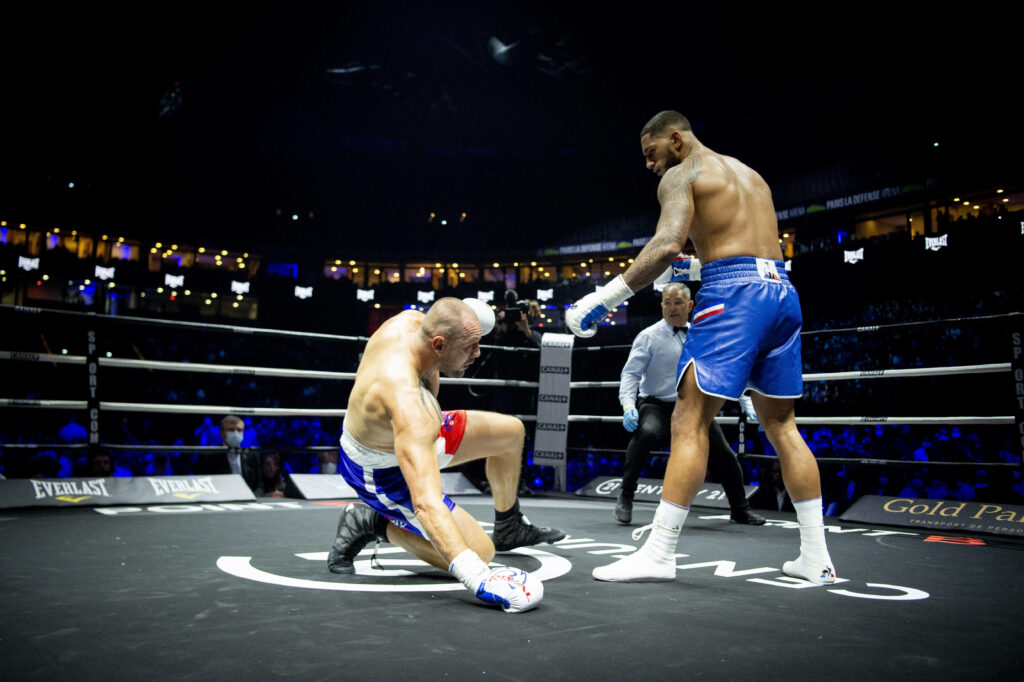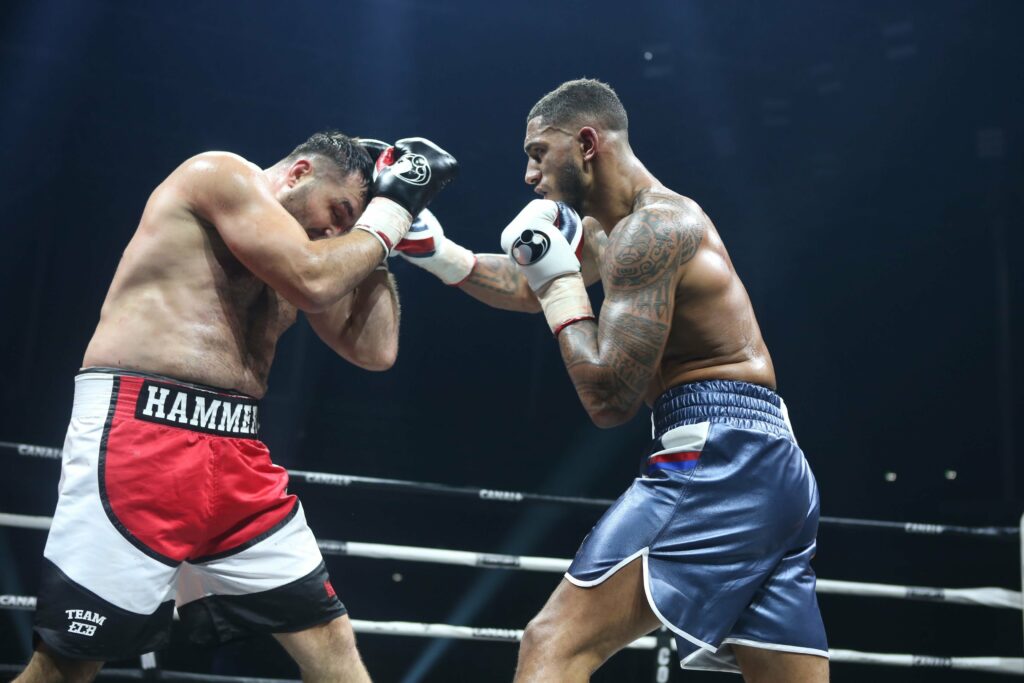Guided by trainer Virgil Hunter and supported by his fellow fighting wife, Tony Yoka is ready to pounce in the heavyweight division, writes Lewis Watson.
It’s Valentine’s Day on San Francisco’s West Coast. As the Californian sun beats down on the tarmac, four footsteps can be heard plodding in rhythm. In the distance are the silhouettes of two Olympic gold medalists, dissimilar in physicality, but equal in stature.
Instead of a traditional exchanging of gifts, Tony and Estelle [Mossely] Yoka, who have two small children Ali and Magomed, are sharing roadwork ahead of their respective fights on March 5. It’s the last push in their shared camp before returning home to France later that week, and heavyweight contender Tony Yoka tells Boxing Social of a unique relationship and his grand plans for a breakout year.
“At first, I wasn’t sure this was going to be a good idea at all. It was because I didn’t want to be stressed watching her fight before me,” Yoka (9-0, 7 KOs) admits candidly. The Frenchman’s upcoming contest with Joel Tambwe Djeko for the EU heavyweight title (not to be confused with the full European/EBU belt held by Yoka’s amateur rival Joe Joyce) will see him share a card with his wife Estelle for the third time as professionals.
“I’m powerless when I watch her fight, so I get a lot more nervous than I ever would about my own fight. When I fight it’s on me; it’s in my hands. But when she’s fighting it’s completely different, all I can do is encourage her.
“But now I am beginning seeing the benefits. It’s great to go through camp together and be able to share our experiences. The good outweighs the bad, that’s for sure, and we both trust each other to get the job done inside the ring.”
Yoka has become one of the most active heavyweights in recent months. Despite the ongoing Covid-19 complications, ‘La Conquete’ will be making his third appearance since late-September, following on from impressive wins over Johann Duhaupas and Christian Hammer.
He admits his lack of detailed knowledge on this weekend’s Belgian opponent, but instead has been concentrating on crafting his own weaponry with the guidance of trainer Virgil Hunter.
“Virgil has been fantastic for me,” he explained. “He’s the perfect coach for me as a professional and one that I needed when I turned over. I was always a skilled and fast heavyweight, Virgil has made me an all-round fighter with a real concentration on my power. I love the style that he helped mould Andre Ward into – replicating this as a heavyweight has been a goal of mine.”

Photo: Press Association.
A successful stint as an amateur saw Yoka claim gold medals at the World Championships and Olympic Games, becoming the only Frenchman to secure a gold up in the super-heavyweight division. He turned over a year later, and the weight of expectation on his young professional shoulders became immediately apparent.
“There is constant pressure on me now – ever since 2016. It’s different to an American fighter, who would go home after the Olympics and not be the biggest star, but overnight I became the biggest name in boxing in my country and it was pretty crazy,” he said.
“I was the main event on my professional debut, even though there was a WBC silver championship fight on the same card [Nordine Oubaali WTKO10 Alejandro Hernandez]. I’ve accepted it now I am a little older, I just hope that my story can inspire the next generation of fighters coming through.”
Yoka is a smooth talker. Despite English being his second language, the 28-year-old glides through his words effortlessly. Not until we begin discussing the current crop of heavyweights does he become more animated.
“This is a huge year for me. If I win this fight [vs Djeko], I’ll be looking at some of the guys in the top ten for a fight around September. I’m ready now to make my move. It’s probably too soon and unviable for me to get in there with the ‘big three’ [Tyson Fury, Anthony Joshua and Deontay Wilder], but I’ll be looking at the level below – Joe Joyce, Dillian Whyte or Dereck Chisora.”

against Christian Hammer in November. Photo: Press Association.
Yoka was due to make his Top Rank debut inside Madison Square Garden last March until the pandemic stuck a pin in the world’s plans. But the rebuild is upon us, and the Frenchman convinces me that the time to prove himself has come.
“It’s great that I have been able to stay active, I feel very lucky. I lost a year due to my suspension [Yoka missed three drugs tests in 2018 and was suspended by the French Anti-Doping Agency for a year] and now I am making up for lost time. Joseph Parker and Filip Hrgovic are two others I’d like to fight – both of who I’ve previously beaten in the amateurs,” he said.
“The thing is, guys like Hrgovic haven’t changed since their amateur days, and they still fight with the same style. I guess it’s benefited me being younger when I turned over – unlike someone of Joe Joyce’s age – that I have been able to adapt my game so well. When you are fighting 12 rounds for a belt, you know that someone is going to get knocked down, you can’t fight how you used to just to win ‘points’. I’ve become a complete heavyweight.”
His dreams are big. Yoka is proud to have family roots in D.R. Congo and advancing with plans to fight in Kinshasa at the site of the ‘Rumble in the Jungle’. He envisages his opportunity at a world title will come within the next two years, looking to match wife Estelle who fights for the IBO’s interpretation of the women’s lightweight title on his next undercard.
Is there a rivalry within the couple? “You know what, there used to be,” he admits coyly. “When we were amateurs fighting in similar tournaments, we would always look to get further than the other, but now as professionals, it’s completely different.
“Now we just help each other. I will still find it hard on fight night not being able to shout and scream for her. I need to keep my composure ahead of my own fights. If I could choose one of us to get handed the victory ahead of Saturday it would be for myself – it’s kind of crazy, man, but I just know she’s going to get the job done anyway.”
Another run banked and a day closer to fight night, Tony and Estelle look at each other as sweat cascades down their faces. It turns out fighting, as well as French, can be the true language of love.
Main image: Alamy/Gruppo Editoriale Live Media. Other photos: Press Association.
